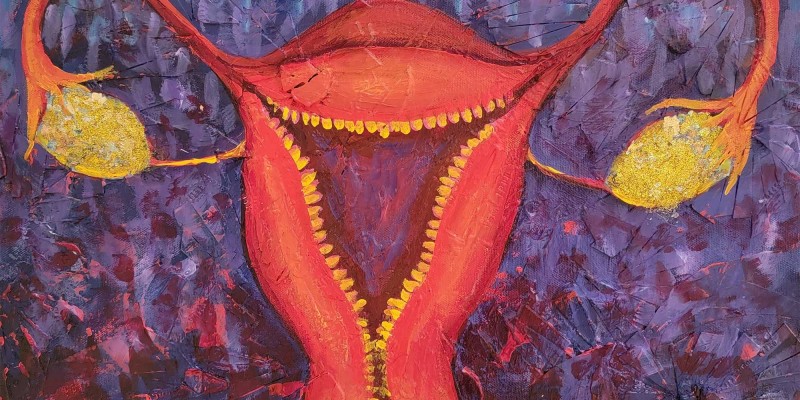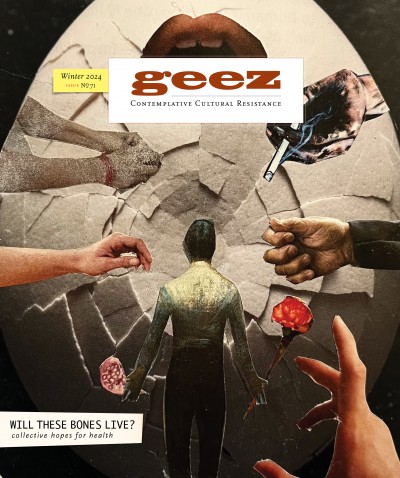We Could Do This Alone: Lessons from My Chinese Postpartum Care

Detail of “Legacy (Uterus, Ovaries and Fallopian Tubes),” Christine J. Holton, 2021, Mixed media, currency and credit cards on canvas, The Corpus Chromatic Series
I spent forty days in a cocoon of care in 2023 after the arrival of my firstborn. This convalescence was a prescription by my mother and the closest thing to a command that she could issue to me. Zuo yuezi, or “sitting the month,” is a centuries-old Chinese postpartum tradition that originated from necessity and poverty. It centres the healing of the birthing parent even over the primacy of the newborn, and it requires the administration of an elder – usually one’s own mother or mother-in-law. During this time, the new parent eats restorative foods, spends most of their time in or near their bed, and delegates most responsibilities to family and community.
Today, yuezi feels like a luxury.
My own mother was not so fortunate. She and my father brought us into the world in fierce and costly independence, separated from family and isolated from community. My mother believed that the postpartum health challenges she faced could have been avoided had she experienced a yuezi after each birth. And so, she was the conductor of mine, determined that I wouldn’t suffer as she did.
The Chinese are not unique for their postpartum healing practices. In Mexico, birthing parents experience a cuaranta. In Nigeria, the Igbo tradition of omugwo serves a similar purpose. In Germany, people undertake wochenbett, or literally, “weeks in bed.”
But I come from the United States, where we lack a national mandate for paid postpartum leave, let alone a standard of quality postpartum health care. Many working postpartum parents are expected to return to the workforce after two or four weeks of rest, at which point some are still bleeding and unable to lift weights, running on the potent fumes of a postpartum hormonal cocktail. Postpartum health policy in the U.S. seems to indicate that bearing and raising children are less valuable activities than economic participation. The increasing nuclearization of middle-class family units means that many non-parents are unaware of the immense labour required to support new parents and their babies.
The specifics of zuo yuezi arose from an agricultural context: avoid bathing because of the scarcity of clean water; eat rich foods because of the demands of subsistence; rest because the alternative is strenuous labour. And yet, its observance today can feel more like privilege than necessity because so many new parents go without comfort and community.
My own yuezi included traditional Chinese foods meant to restore my strength and fill the emptiness that birth created. It also included the provision of our church and the friends who came to walk our dog and talk to us. It included the loving touch of a doula who taught and held us. And crucially, it included paid time off for both my wife and me.
In the midst of my yuezi, I couldn’t separate gratitude from guilt. I was weaker than I thought I’d be. My sleep was fractured by night wakings, frequent pumping, and the adrenaline and cortisol that flood the body after birth. “And this,” I thought, “was my experience even with the best of care.”
The guilt and gratitude, the intense need, and the relinquishment of control, created a coil of questions about privilege and responsibility:
Should I prioritize my own rest when what is asked of me is paramount? How can I rest when I’m painfully aware of parents who undertake the same ordeal with fewer resources than I have?
Is interdependency a sufficient response to my own need? Is interdependency a sufficient answer to the needs of others?
What are my material and spiritual duties to others who will become parents – and to my community at large?
Zuo yuezi was an experience of unparalleled learning: I was mothered as I became a mother. Popular wisdom in the U.S. assured me that rest is important because it better prepares me to work: to be of service to my family and society. I could not pour from an empty cup, I learned. But during my yuezi, I watched and fell in love with my daughter who spent much of her days sleeping. Meanwhile, I frequently heard my own mother’s demands that I rest. I believe now that we deserve to rest, in our postpartum days and otherwise, not only because it makes us better members of our families and society, but because we inherently need it as beloved creatures of God.
On this side of those acute postpartum days, I also see with more tenderness that interdependency is not a sign of weakness; it’s the fruit of connectedness. I told our doula, “I couldn’t have done this without you.”
With her hands over mine, she replied, “You could have. But you shouldn’t have to.”
Zuo yuezi is like many health measures that work: an uncomfortable tangle of privilege and necessity, and an invitation to advocacy. What we truly need to be well is too often out of reach.
Individualism taught me to accept others’ deprivation as my fault, as though I alone were capable of the systemic change necessary to transform postpartum care. But what I’m learning through my own matrescence is that there’s a difference between fault and responsibility. We are our mothers’ keepers. Or, more accurately, we can co-create a better reality for other parents.
Those first weeks in bed, I often turned to prayer to bridle my sleepless postpartum imagination. I thought of the many stories of Jesus healing. They include a woman who bled without ceasing; a man at the baths of Bethesda who was paralyzed; and a Samaritan woman at a well who was healed not from a physical ailment but from misconceptions by her peers. In many of these stories of healing, the outcast receives not only the wellness they desire but also the chance to be reconciled to their community. The logical outcome of healing was that the healed became the apostles – the first bearers of good news. Light crept out from under a bushel.
To tell the good news in our own context includes testifying before our elected officials to advocate for paid family leave. It includes letters to the editor, grassroots advocacy efforts, local organizing, and more. In our workplaces, it provokes us to review our benefits for gender equity and maximized paid time off. It encourages us to fight for policies from which we may never benefit but that will ease the way of new parents to come. And it invites us to step boldly into the circle of care for those whose families are about to expand.
We could do this alone. We could do this without each other. But we shouldn’t have to.
To share the good news of postpartum care done well includes telling the story of our healing. It includes being unashamed of our interdependency. Zuo yuezi and other postpartum care practices dispel the myth of independence and resurrect the global, age-old story of how we heal: together, cyclically, yes – for our children’s sake, and for the sake of our own wholeness.
Ophelia Hu Kinney lives in Maine with her wife and daughter. She is a child of Chinese immigrants.



Start the Discussion